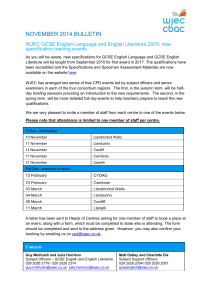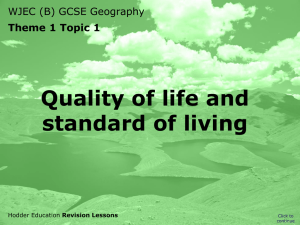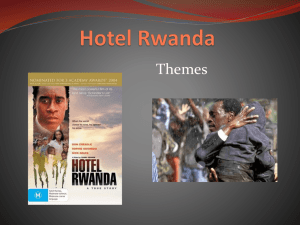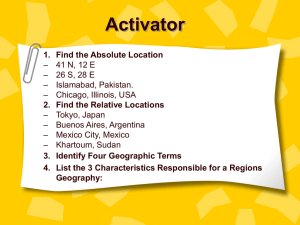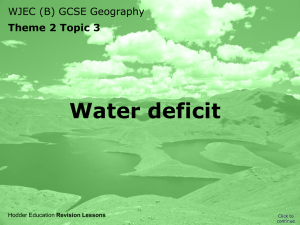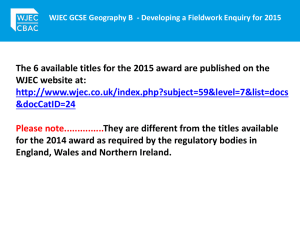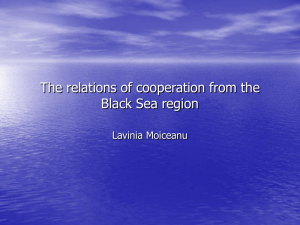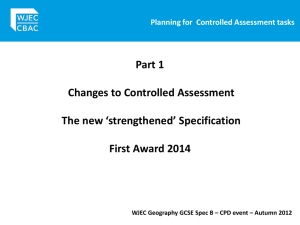GCSE Geography Specification A Qualification Overview
advertisement
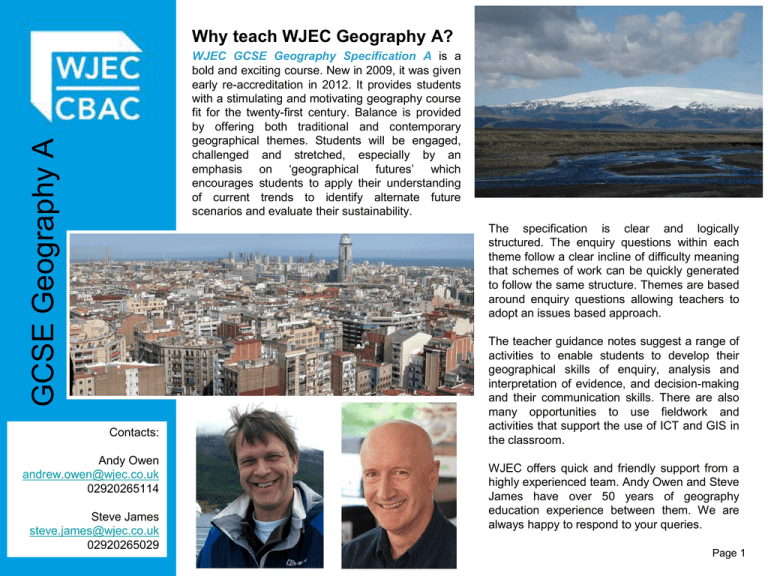
Why teach WJEC Geography A? GCSE Geography A WJEC GCSE Geography Specification A is a bold and exciting course. New in 2009, it was given early re-accreditation in 2012. It provides students with a stimulating and motivating geography course fit for the twenty-first century. Balance is provided by offering both traditional and contemporary geographical themes. Students will be engaged, challenged and stretched, especially by an emphasis on ‘geographical futures’ which encourages students to apply their understanding of current trends to identify alternate future scenarios and evaluate their sustainability. The specification is clear and logically structured. The enquiry questions within each theme follow a clear incline of difficulty meaning that schemes of work can be quickly generated to follow the same structure. Themes are based around enquiry questions allowing teachers to adopt an issues based approach. Contacts: Andy Owen andrew.owen@wjec.co.uk 02920265114 Steve James steve.james@wjec.co.uk 02920265029 The teacher guidance notes suggest a range of activities to enable students to develop their geographical skills of enquiry, analysis and interpretation of evidence, and decision-making and their communication skills. There are also many opportunities to use fieldwork and activities that support the use of ICT and GIS in the classroom. WJEC offers quick and friendly support from a highly experienced team. Andy Owen and Steve James have over 50 years of geography education experience between them. We are always happy to respond to your queries. Page 1 Core and optional themes GCSE Geography A WJEC GCSE Geography Specification A is divided into core and optional themes. Unit 1 gives students a robust core of geographical understanding. Unit 2 provides teachers with an opportunity to select from a range of contemporary themes. Together the two units provide, respectively, breadth and depth of study. Unit 1 Core themes There are three physical and three human themes in Unit 1. Between them, these themes provide students with an overview of the essential knowledge and concepts required for GCSE. Each theme examines process and pattern before considering management strategies. We recommend you spend 10 - 12 hours teaching each of these themes. However, if you base one of the controlled assessment tasks on a core theme, you will need to spend more time on this component. Contacts: Andy Owen andrew.owen@wjec.co.uk 02920265114 Steve James steve.james@wjec.co.uk 02920265029 ↑ Arriva Malta, globalisation is a core theme Water Population Tectonics Globalisation Climate change Development Core themes ← Gulfoss, Iceland. River process and landform development are part of the water theme. Page 2 ← Urban waterfront redevelopment, Barcelona GCSE Geography A ↓ Coastal landforms and explosion crater, Vulcano, Italy Unit 2 Optional themes Unit 2 offers choice and flexibility through six optional themes. Three must be studied, including at least one human and one physical theme. This allows students to develop depth of knowledge and understanding in areas they feel are most relevant to their interests and needs. The optional themes require greater depth of study than the core and candidates should be encouraged to develop a range of case studies. Each theme begins by considering patterns and process before considering recent change. Each places an emphasis on geographical futures, encouraging candidates to apply their understanding of current trends to identify alternate future scenarios and consider sustainable developments. We recommend you spend 12 - 15 hours teaching each of these themes. However, if you base one of the Controlled Assessment tasks on an optional theme, you will need to allocate more time to this component. Optional themes Our changing coasts Tourism Weather and climate Retail and urban change Living things Economic geography of Wales Page 3 Assessment Unit 1 (1 hour 45 min: 40%) examines the core with six compulsory questions, each worth 15 marks. Contacts: Andy Owen andrew.owen@wjec.co.uk 02920265114 Steve James steve.james@wjec.co.uk 02920265029 Unit 2 (1 hour 15 min: 35%) examines the optional themes. Candidates answer three 20 mark questions. Unit 3 (25%) candidates complete two pieces of Controlled Assessment, one of which must be based on fieldwork. Specimen Assessment Materials (for first assessment in 2014) are illustrated here and are available in full on the WJEC website. ↑ A structured question from Unit 1, Foundation tier. ← A question from Unit 2, Higher tier, requiring an extended response Page 4 Controlled Assessment Candidates complete two controlled assessment tasks: • A fieldwork enquiry worth 10% • A decision making / problem solving task worth 15% GCSE Geography A Eight pairs of generic tasks are published by WJEC annually, giving an opportunity for centres to select and contextualise a task that is appropriate for its resources and its students’ needs. The specification offers plenty of opportunities for fieldwork in either physical or human themes. River or coastal processes and landforms are popular options. Many centres chose to base their decision making exercise on the future management of specific coastlines, or the sustainable development of tourism. Examples of contextualised DME tasks used 2011 Contacts: Andy Owen andrew.owen@wjec.co.uk 02920265114 Steve James steve.james@wjec.co.uk 02920265029 How can the people of the Western Cape, South Africa, benefit from tourism without harming the environment or future generations? Examples of contextualised fieldwork tasks used in 2011 How should coastal flooding of the Newport levels be managed in the future? How do coastal management strategies affect beach profiles at Walton-on-the-Naze? Locating an urban beach in Paris How and why does discharge vary downstream along the River Onny? Page 5
